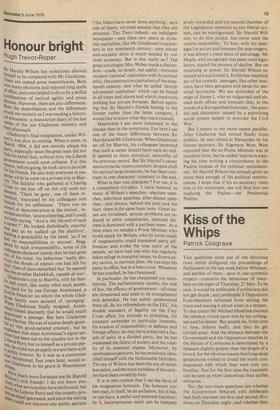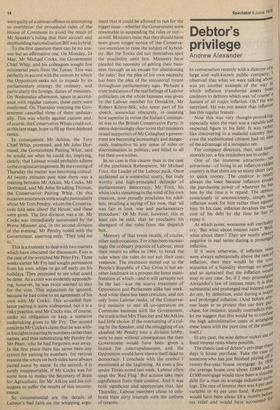Kiss of the Whips
Patrick Cosgrave
Two questions arise out of the ferocious rows which disfigured the proceedings of Parliament in the last week before Whitsun; and neither of them—save in one symbolic respect—concerns the behaviour of members on the night of Thursday, 27 May. To be sure, it would be preferable if politicians did not get drunk ; and preferable if Opposition front-benchers refrained from seizing the mace and waving it about when in a temper. To that extent Mr Michael Heseltine merited the rebukes visited upon him by his colleagues and his leader. But people do, from time to time, behave badly, and they do get carried away. And the distance between the Government and the Opposition benches in the House of Commons is determined by a measure slightly greater than the length of a sword, for the obvious reason that long-dead generations wished to avoid the worst consequences with which they were only too familiar. Not for the first time the twentieth can be seen as more censorious than earlier centuries.
No: the two main questions are whether the Government behaved with ,deliberate bad faith between the first and second divisions on Thursday night ; and whether they were guilty of a serious offence in attempting to overthrow the procedural rules of the House of Commons to avoid the result of Mr Speaker's ruling that their aircraft and shipbuilding nationalisation Bill was hybrid.
• To the first question there can be no answer but an affirmative one. On Monday, 24 May, Mr Michael Cocks, the Government 'Chief Whip, and his colleagues sought five ministerial pairs from the Tories. This was perfectly in accord with the custom by which the Opposition seeks not to impede by its parliamentary strategy the ordinary, and particularly the foreign, duties of ministers. On Wednesday afternoon, again in accordance with regular custom, these pairs were confirmed. On Thursday morning the Government cancelled three of them unilaterally. This was wholly against custom and, of course, the Conservative Whips could not, at this late stage, hope to fill up their depleted ranks.
In consequence Mr Atkins, the Tory Chief Whip, protested, and Mr John Dormand, the Government Pairing Whip, said he would see what he could do, implying, clearly, that Labour would probably adhere to the original arrangement. By theevening of Thursday the matter was becoming critical. At twenty minutes past nine there was a meeting between Mr Atkins, Mr Cocks, Mr Dormand, and Mr John Stradling Thomas, the Conservative Pairing Whip. On this occasion assurances were sought particularly about Mr Tom Pendry, whom the Conservatives had seen about the House, and these were given. The first division was a tie. Mr Cocks was immediately summoned by the Prime Minister and, in the second division of the evening, Mr Pendry voted with the Government, asserting only, 'They told me to.'
This is a moment to deal with two matters which have obscured the discussion. First is the case of the wretched Mr Peter Fry. Three weeks earlier Mr Fry had sought permission from his own whips to go off early on his holidays. They promised to see what could be done. As a crisis was evidently approaching, however, he was twice warned to stay for the vote. This injunction he ignored, because he had come to an agreement of his own with Mr Cocks. This so-called freelance pairing is quite widespread, but it is a risky practice, and Mr Cocks was, of course, under no obligation to keep a tentative undertaking given to Mr Fry. The second concerns Mr Cocks's claim that he was with in his rights in pairing by numbers rather than names, and thus substituting Mr Pendry for Mr Peart, who he had forgotten was away.
In the first place there has never been any system for pairing by numbers: for various reasons the whips on both sides have always paired name by name. In the second, it is surely insupportable, if Mr Cocks was for some time to mislay the Secretary of State for Agriculture, for Mr Atkins and his colleagues to suffer the results of this incompetence.
So circumstantial are the details of Labour's bad faith on the whipping argu
ment that it could be allowed to run for the bigger issue—whether the Government were reasonable in suspending the rules or not— as well. Ministers insist that they should have been given longer notice of the Conservative intention to raise the subject of hybridity. But the Tories did not themselves spot the possibility until late. Ministers have pleaded the necessity of getting their business through as an excuse for abandoning the rules: but the plea of his own necessity has been the plea of the ministerial tyrant throughout parliamentary ages. Perhaps a truer indication of the real feelings of Labour politicians on the whole business was given by the Labour member for Ormskirk, Mr Robert Kilroy-Silk, who spent part of his speech, somewhat obscurely, in insisting how superior in virtue the Italian Communist was to the British Conservative Party. It seems depressingly clear to me that ministers in and supporters of Mr Callaghan's government are becoming increasingly and dangerously insensitive to any sense of rules or discrimination in politics; and blind to all but their own wishes.
In no case is this clearer than in the case of the pinchbeck Robespierre, Mr Michael Foot, the Leader of the Labour pack. Once acclaimed as a somewhat scatty, but truly worthy and high-principled defender of parliamentary democracy, Mr Foot, his white locks streaming in the wind of his own creation, now proudly proclaims his nihilism, recalling a saying of his own, that 'all was fair in love, war and parliamentary procedure.' Of Mr Foot, however, this at least can be said, that he proclaims his disregard of the rules from the dispatch box.
Memory of that event recalls, of course, other such occasions. For it has been increasingly the ordinary practice of Labour, since their return to office in 1964, to break the rules when the rules do not suit their convenience. The treatment meted out to the People's Republic of Clay Cross is but another landmark in a process the latest manifestation of which—and it will certainly not be the last—was the scurvy treatment of Opposition and Parliament alike last week. And while there has been criticism, and not only from Labour ranks, of the Conservative decision to end all co-operation on Commons business with the Government, the truth is that Mrs Thatcher and Mr Atkins had little choice. If the overturning of a ruling by the Speaker, and the smuggling of an abashed Mr Pendry into a division lobby, were to pass without consequence the then Government would have been given a licence for unscrupulousness, and the Opposition would have shown itself dead to democracy. I conclude with the symbol I mentioned at the beginning. As even a few senior Tories noted last week, Labour often sings the 'Red Flag.' But actions take their significance from their context. And it was both significant and appropriate that, last Thursday, Labour members chose to celebrate their dirty triumph with the anthem of tyranny.



































 Previous page
Previous page